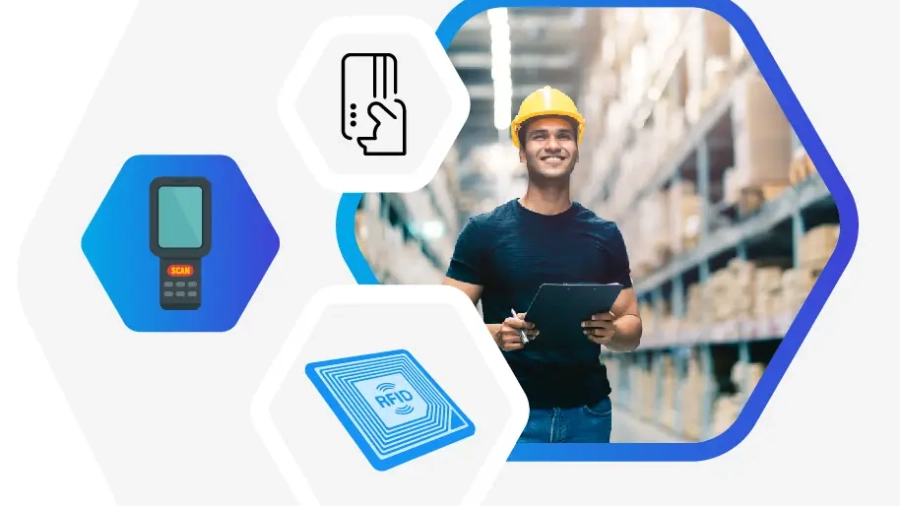Choosing the right technology for transport logistics can be challenging. Both RFID in transportation and GPS have their unique advantages. Understanding their differences helps in making an informed decision. RFID (Radio Frequency Identification) technology provides real-time information about the location and status of items within a defined range. GPS (Global Positioning System) technology, on the other hand, offers precise tracking of vehicles over long distances. This blog explores the strengths and limitations of both technologies, helping you determine which is best suited for your logistics needs. By examining their applications and benefits, you can optimize your logistics operations for efficiency and accuracy.
1. Understanding RFID Technology
RFID in logistics uses radio frequency identification to track and manage assets. RFID tags store data that can be read by scanners. Providing real-time information about the location and status of items.
RFID is highly effective in closed environments, such as warehouses or shipping yards. It allows for automated tracking, reducing human error. Additionally, RFID systems can process multiple tags simultaneously, making them efficient for bulk tracking.
2. Understanding GPS Technology
GPS technology uses satellites to determine an object’s precise location. It is widely used for navigation and vehicle tracking. GPS provides real-time location data, making route planning and monitoring essential.
GPS is handy for tracking moving vehicles over long distances. It helps in route optimization and ensures timely deliveries. Additionally, GPS can provide data on vehicle speed and stops, aiding in fleet management.
3. Benefits of RFID in Transportation
Implementing RFID in transportation offers several benefits. It enhances asset visibility and reduces the risk of theft. RFID can track individual items within containers, providing detailed inventory information.
RFID also improves operational efficiency by automating data collection. This reduces the need for manual checks and speeds up processes. Furthermore, RFID systems can trigger alerts for unusual activity, enhancing security.
4. Benefits of GPS in Transportation
GPS technology is crucial for real-time vehicle tracking. It helps in monitoring the exact location of trucks and other transport vehicles. This real-time data ensures better route planning and timely deliveries.
GPS also aids in optimizing fuel usage and reducing operational costs. By monitoring routes and driver behavior, companies can identify areas for improvement. GPS systems enhance overall fleet management by providing comprehensive data.
5. Limitations of RFID
While RFID in logistics is powerful, it has limitations. RFID systems can be expensive to install and maintain, and the initial setup requires significant investment in tags, readers, and software.
RFID also has a limited range compared to GPS. It is best suited for tracking items within a specific area rather than over long distances. Environmental factors like metal or water can interfere with RFID signals.
6. Limitations of GPS
While widely used, GPS technology also has drawbacks. It relies on satellite signals, which can be disrupted by weather conditions or obstructions, leading to inaccuracies in location data.
GPS systems can also be costly, especially for a large fleet. The ongoing costs of data plans and maintenance can add up. Additionally, GPS does not provide detailed information on individual items within a shipment.
7. Combining RFID and GPS
For optimal results, many companies combine RFID in transportation with GPS. This hybrid approach leverages the strengths of both technologies. RFID can track items within containers, while GPS monitors vehicle locations. Combining these technologies provides comprehensive visibility. It ensures that assets are tracked from the warehouse to the final destination. This integration enhances efficiency and reduces the risk of loss or theft.
Secondary Sections
Factors to Consider When Choosing Between RFID and GPS
When deciding between RFID and GPS for your logistics needs, consider the following factors:
- Range and Coverage: GPS is better for long-range tracking, while RFID is ideal for short-range, detailed tracking within specific areas.
- Cost: Evaluate the total cost of ownership, including installation, maintenance, and operational costs for both technologies.
- Environmental Conditions: Consider the operating environment. RFID may struggle with interference from metals or liquids, while GPS can be affected by weather and obstructions.
- Data Requirements: Determine the level of detail you need. RFID provides detailed item-level tracking, while GPS offers vehicle and route-level data.
- Integration: Assess how well each technology integrates with your existing systems and processes. A seamless integration can enhance efficiency and reduce complexity.
Best Practices for Implementing RFID and GPS in Logistics
To maximize the benefits of RFID and GPS technologies in logistics, follow these best practices:
Conduct a Needs Assessment
- Identify specific logistics challenges that RFID or GPS can address.
- Determine the scope and scale of the implementation based on your operational needs.
Pilot Testing
- Start with a pilot project to test the chosen technology in a controlled environment.
- Evaluate performance, identify potential issues, and gather feedback from users.
Invest in Training
- Provide comprehensive training for staff on how to use and maintain the new technology.
- Ensure that all relevant personnel know the system’s capabilities and limitations.
Monitor and Optimize
- Continuously monitor the performance of the RFID or GPS system.
- Use data analytics to identify areas for improvement and optimize processes.
Maintain and Update
- Regularly maintain and update the technology to ensure optimal performance.
- Stay informed about advancements in RFID and GPS to leverage new features and capabilities.
Conclusion
Choosing between RFID and GPS depends on your specific logistics needs. While RFID in transportation excels in asset visibility and inventory management, GPS is indispensable for vehicle tracking and route optimization. For comprehensive and effective solutions, consider combining both technologies. To find the best RFID and GPS solutions, visit Lowry Solutions. They are the best RFID solutions provider, offering tailored solutions to enhance logistics operations. Partnering with Lowry Solutions ensures that your logistics processes are efficient, secure, and optimized for success.

